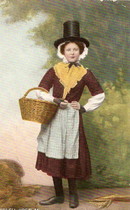Caerfyrddin - 1398
The tunnel stank of effluent, the walls dripping with dampness and other things which the man did not care to think about. Making sure that the rusty gate was closed behind him, he edged carefully along through the darkness, only opening the lantern when he felt certain that no one would see the light from outside.
He had gone only a few yards when he spotted the markings on the wall, the crudely-drawn shape of a bear and bear cub. Hardly daring to breathe, he found a ledge where he placed the flickering light of the tallow candle and took out a sharp knife from the sheath bound to his leg. Then he began to scrape away the mortar.
He wiped the sweat from his face and, gritting his teeth, continued to worry at the stone. At last, there was movement and, with a little more effort, he was able to pull away a small piece of the wall. He placed it quietly and carefully on the ground and pushed his hand into the space; there was definitely something there, a metal box of some kind.
Again he pulled at the stones surrounding the opening and, after a few minutes of struggle, he pulled at the casket. There was a scraping noise as the box moved out of its hiding space and the man paused a moment, listening out for anyone who might have followed him. There was absolute silence, apart from the splashing sound of the river Wynfeth outside.
Once more he pulled and, this time, the entire casket came out and he gasped at the weight. Untying the sack from his waist, he put the box into it and lifted it gently onto one shoulder. Picking up the lantern, he made his way slowly back to the gate, cursing under his breath at the awkwardness of his burden. Before he reached the metal bars, he covered the lantern again and listened.
Two voices, speaking Norman French.
'We've lost him. Curse him!'
'I saw him come this way. He must have doubled back somehow. You wait here and I'll go back up to the tavern.'
The man stood absolutely still behind the metal grille while one of the Normans sat down outside and took out a stone bottle of wine, taking a hefty glug and belching with brio. This clearly wasn't the first drink the Norman had taken that night and he started chuckling to himself and singing a ribald song.
'Give him another few minutes to finish the wine,' thought the man, 'and I'll be able to get away.'
As expected, after draining the bottle, the Norman started to snore loudly. Slowly, the man opened the metal grille, hefted the sack onto the river path and lifted himself out of the tunnel. He closed the grille again, removed his knife from its sheath and quickly drew it across the Norman's throat. Then he rolled the body over and pushed it into the Wynfeth; it wouldn't be long before it was taken down to the Towy and lost forever.
Lifting the sack and the lantern, he moved as quickly as he could up the path to the small boat he'd left tied to the bank. It only took a few strong strokes of the oars to get across the Wynfeth to the Friary. His heart beating wildly, he clambered up onto the bank, pulling the sack after him and made a dash for the Friary's side door. Just as the door opened and he pushed the sack inside, he felt the slash of a knife on his thigh and, yelling with pain, he collapsed through the doorway. Willing hands pulled him in and slammed the door. In the moments before he lost consciousness, he heard a voice tell him that he was safe and that the casket was safe.
A week later, a cart left the Friary, heading eastward. There was nothing unusual in this as the Friary supplied medicines to the villages outside Carmarthen and the Friary's physician made regular visits to outlying areas, taking mead brewed by the Friars along with other goods from the town. The physician sat in the back of the cart while the space next to the carter was taken by a young boy, the physician's assistant. At the little village of Nantgaredig, the cart turned left up a hill and the carter guided the horse into the yard of a smallholding.
Taking the cover off the cart, the physician revealed a man lying very still on a hurdle with a long casket lying beside him. A young man emerged from the farmhouse and helped the carter carry the hurdle with its burden, while the casket was carried with due reverence by the physician and the young boy. While the boy went to take care of the ailing man, the physician slipped quietly into the washhouse which had been built on the site of an old Roman bathhouse and still had remnants of the old Roman hypocausts beneath. Checking that no one was watching him, the physician pulled up some old tiles and, with effort, pushed the casket down into the space under the floor. Replacing the tiles carefully, he nodded with satisfaction at his handiwork. said a short prayer and went to join the others in the farmhouse.



